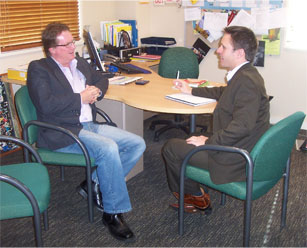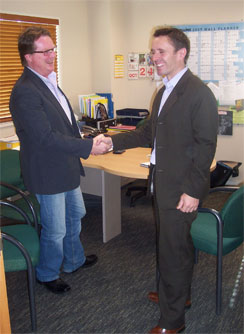Starting with what we know
Content
Foundation students come from a huge variety of backgrounds and bring with them many valuable life experiences. This lesson draws on some of these experiences and fosters the mentoring that occurs when there is a mixture of mature and younger students in a class. Classes will have students who have experienced an interview of some sort for work or for a course (in fact, most Foundation students will have been through an interview for selection on to the Foundation programme). In groups, students will be able to discuss previous interview experience and brainstorm what makes an interview a positive or a negative experience.
Objectives
- Identify an interview scenario that was experienced by a student and the type of questions that were asked in that scenario
- Identify both positive and negative parts of an interview, ie, what went well and what did not go well
- Differentiate between experiences that will lead to success and those that will not
Resources
Web pages:
- The job interview – Send good signals and communicate attitudes (Minnesota Department of Employment and Economic Development web site)
http://www.deed.state.mn.us/cjs/cjsbook/interview3.htm
- How to ace your job interview: 88 surefire tips and tricks (Online Education Database)
http://oedb.org/library/starting-a-career/88-surefire-job-interview-tips
Videos:
- General job interview skills (1)
http://www.youtube.com/watch?v=roZs-Eu4eZo&feature=PlayList&p=37D1515892814808&index=0&playnext=1
Activities
Recap
- It would be good to use the General Job Interview Skills (1) video to recap on some issues regarding dressing for an interview, as well as to get students thinking along the lines of what would or would not make an interview a success
- Review with students how to use IM chat for both text and voice as this will be necessary for group work
Main activity
- Assign students to a group of 4/5
- Explain the requirements of the activity that will be done in these groups
- Groups can chose to remain seated around the dome, in individual interview rooms, or on garden seating or in the seating in the student area.
- Each group will need to:
- Select an interview to discuss (if the unimaginable happens and no one in a group has experienced an interview previously, it may be necessary to slightly adjust the groups)
- The student whose interview experience has been selected will need to describe his/her experience in detail to the group while students note down main points in a note card or on paper at their computer
- All group members will need to ask questions to elicit information from the group member who is leading the discussion
- The discussion must include information on the stages of the interview, how well each stage went, what was done well, what could have been improved, and how the student who was interviewed felt at the time
- Groups will also need to brainstorm general ideas about what would make an interview a success and what would cause an interview to fail
- Select an interview to discuss (if the unimaginable happens and no one in a group has experienced an interview previously, it may be necessary to slightly adjust the groups)
- Each group will then bring their ideas to a class discussion in the dome (this can be in the seating for the media screen)
- Once the class has discussed the group’s findings, a group might like to volunteer to role-play what happened in the interview that was discussed (the interview room could be rezzed for the role-play)
Reflection/evaluation
- Before the end of the session each group will have to submit one note card to the drop box
- The group note card must list both the positive and the negative elements of the interview that was discussed (and possibly role-played)
- All members of the group must have their names on the note card

